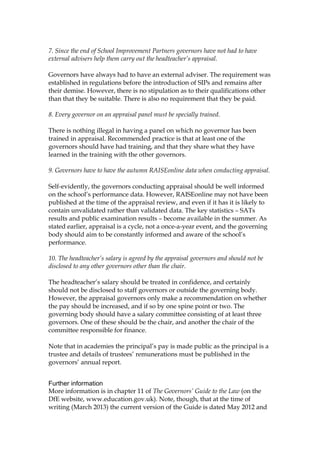This document summarizes 10 myths about the appraisal (performance management) process for headteachers. It explains that many of the assumptions about how appraisals must be conducted are no longer legally required, including that appraisals must be conducted by a panel of 2-3 governors, objectives can only be shared with certain parties, and the appraisal cycle must run December to December. It emphasizes that governing bodies now have flexibility to determine procedures based on their school's needs as long as basic requirements are met, such as involving an external adviser.
![10 Myths about Appraisal (Performance Management)
1. The appraisal of the headteacher has to be conducted by a panel of two or three
governors.
It is up to the governing body to decide how to conduct the appraisal of the
headteacher. The panel of two or three was established in the early days of
performance management, and has been repeated in various editions of the
Guide to the Law, but is no longer stipulated in the latest regulations. The
governing body has freedom to decide how it will conduct appraisal.
However, a panel of two or three is still sensible as it gives you enough
governors to supply expertise, without putting in so many as to be unwieldy.
But it is not a legal requirement.
2. The headteacher’s objectives can only be shared by the appraisal panel, the
headteacher and the chair of governors.
This has not been a legal requirement since 2007, but was established as the
normal way of working by the Rewards and Incentives Group. This was a
committee of employers and trade unions established by the previous
government in order to agree the best way to conduct performance
management. It was disbanded by the Coalition, and the current regulations
are not the same as those under which RIG operated.
In fact, it was a requirement that the objectives were shared with the
governing body, as The School Governors’ Guide to the Law said: the “signed
statement [i.e. the agreed objectives] must be passed to the governing body”
(chapter 11). The latest regulations make no stipulation either way, leaving it
up to the governing body to decide whether to share the objectives or not. In
any event, staff governors should be excluded from circulation, and the
agreement of the headteacher should be sought.
3. The headteacher should appraise staff before being appraised by the governing body.
Previous regulations implied that the headteacher’s appraisal should be
conducted after those of the teachers, but this is no longer the case with the
2012 appraisal regulations. It is up to the governing body to decide whether
that is the best order or whether it makes better sense for them to conduct the
headteacher’s appraisal first.](https://image.slidesharecdn.com/10mythsaboutappraisalfinalversion1-130530071921-phpapp02/75/10-myths-about-appraisal-final-version-1-1-2048.jpg)


